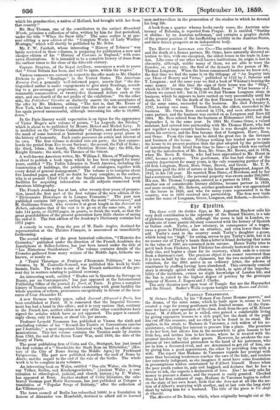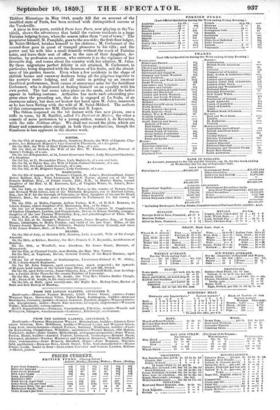PARISIAN THEATRICALS.
M. Octave Feuillet, by his "Roman d'un Jenne Homme pauvre," and the drama, of the same name, which he built upon it, seems to have created a rage for young gentlemen with limited means. At the Gym- nese we have a new specimen of the class, fresh from the pen of M. Ernest Serret. M. d'Albert, as he is called, once gained a comfortable living by giving expensive lessons to a rich pupil, but the death of the pupil has cut off this resource, and no other is to be found in its stead. He applies in his strait, to Madame de Varennes, a rich widow of his ac- quaint/Lee, soliciting her interest to procure him a place. She promises to do her best, but allows him in the meanwhile to give lessons to her little boy, and invites him to her house, where he is treated with the greatest insolence by the other guests. However, he awakens the sus- picions of two influential pretenders to the hand of his patroness who see in him a favoured rival, and are determined to get rid of him, one by giving him a good appointment, the other by providing him with a wife. The report that Madame de Varennes regards her protege with more than becoming tenderness reaches the ears of the lady, and renders her extremely indignant, as she imagines it must have some foundation in presumptuous wishes entertained by d'Albert himself. Hence when the poor youth rushes in, pale and haggard, and declares that he has a favour to ask, she expects a declaration of love. Alas ! he only asks for money to procure a dinner, and the request is easily granted. Checked thus in her first outburst of rage, Madame de Varennes begins to reflect on the state of her own heart, fmds that she does not at all like the no- tion of d'Albert's marrying with another, and at last cuts the long story short by taking him for a husband. The title of the piece is Un Ange de Charite. The Marti tre of De Balzac, which, when originally brought out at the
Theatre Historique in May 1848, nearly fell flat on account of the troubled state of Paris, has been revived with distinguished success at the Vaudeville.
A piece in four parts, entitled Paris hors Paris, now playing at the Va- rietes, shows the adventures that befall the various residents in a large Parisian lodging-house, when the season takes them "out of town." The proprietor himself, M. Pamphile, goes to the sea-side; the first-floor lodger, M. Saint-Medard, betakes himself to his château; M. Cerbonnet of the second-floor goes in quest of tranquil pleasures to his villa; and the porter and his wife hire a small domicile without the reach of Parisian noise, and leave their seat of office to the care of their daughter, Ar- thurine, by profession an actress, who entrusts it to the vigilance of her favourite dog, and roams about the country with her admirer, M. Jules. By these migrations perfect felicity is not attained, M. Carbonnet, in particular, being disgusted with the dearness of his fruits, and the abund- ance of his garden insects. Even when a few accidents in the shape of skittish horses and runaway donkeys bring all the pilgrims together in the porter's rustic lodging, and all unite in getting up an amateur theatrical performance, fresh causes of annoyance arise for the fastidious Cerbonnet, who is displeased at finding himself on an equality with his own porter. The last scene takes place on the sands, and all the ladies appear in bathing costume. Arthurine has made such astounding pro- gress since the preceding act, that she is engaged at La Scala, at an enormous salary, but does not bestow her hand upon M. Jules, inasmuch as he has been flirting with the wife of M. Saint-Medard. The authors of this extravaganza are MM. Clairville and B. Lopez.
The Odeon reopened on the 1st instant with two new pieces, one a trifle in verse, by M. Barillot, called Da Portrait de _Maitre, the other a comedy of more pretension by a young author, named A. de Keranion, with the title Noblesse oblige. We shall not record the plots, which are flimsy and common-place enough in both these productions, though the flimsiness is lees apparent in the shorter work.



























 Previous page
Previous page